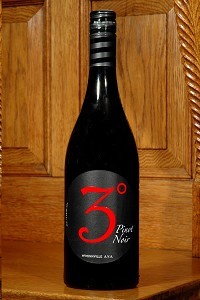
Maysara Pinot Noir 3 Degrees 750ml
Maysara Pinot Noir 3 Degrees 750ml 29560-od
| Wine maker notes |
| In 1997, Moe and Flora Momtazi purchased 532 acres of abandoned wheat farm just south of their home in McMinnville, Oregon. Though most saw it as wild and uncared for, Moe saw a vital, thriving piece of land that had been free from chemicals for seven years. The first year was spent mainly on infrastructure and land reclamation. Though the use of chemicals would have made the process much quicker and more economical, not a single one has been or will be used. Instead, the ground was turned over many times during that first summer to eliminate unwanted plants and weeds and return it to a usable state. We began planting in March of 1998 with three blocks of self rooted Pommard clone Pinot Noir, consisting of 13 acres total. In early spring of 1999, over 120,000 plants were grafted in our own greenhouses. These vines were planted towards the end of the summer. We put quite a bit of time and research into planting different varieties in the different soil types found around the vineyard to find the best combinations possible. Today we have over 250 acres of vines planted. In 2001 an 8-acre reservoir, the first and largest of two on the property, was completed. Fed by natural springs and run-off, they are a source of irrigation water and a new home for some rainbow trout. Rainbow trout require the purest water, and since the reservoirs sit at the lowest points on the property, we consider their thriving population a testament to our farming methods. The original 13 acres produced fruit the same year, making 2001 our first vintage. From the beginning we felt the location had promise, and this was confirmed by our 2001 vintage. Our unique niche in the foothills of Oregon’s Coastal Range separates us from valley weather influences. This microclimate provides slightly warmer days and much cooler nights with less rain. The property has highly diversified soil types consisting primarily of Nekia and Yamhill Series, laced with veins of Peavine and Jory. By training and pruning our vines to produce between 1. 5 to 2 tons per acre, we believe we are getting the best fruit possible from this unique spot. Both the vineyard and terroir are important, but vineyard practices are key. We believe that ninety percent of winemaking takes place in the vineyards. As such, we have held ourselves to a strict form of land use. Unlike conventional farming, we do not mine the land, but nurture it and reap the rewards. There is a complete absence of chemical use throughout the property. Instead we grow a variety of plants and herbs that we make into compost teas to harness their beneficial properties. It is essentially a ”from nature to nature” philosophy. As such, compost and Biodynamic preparations are extremely important in our vineyards. We have multiple compost piles and as they mature, the resulting humus is worked into our vineyards and potential vineyard sites throughout the farm. It is our goal to achieve long-term earth and vine health. We believe that healthy soil and healthy vines will produce superior grapes, without the need for commercial chemicals and man-made poisons. Our quality shows in the dedication of our grape buyers year after year, and the award winning wines they produce from the Momtazi fruit. The consistent, high quality wines made from the Momtazi fruit leads us to believe that our dedication to the terroir and our Biodynamic farming technique is well worth the effort. |
| Producer |
| In 1997, Moe and Flora Momtazi purchased 532 acres of abandoned wheat farm just south of their home in McMinnville, Oregon. Though most saw it as wild and uncared for, Moe saw a vital, thriving piece of land that had been free from chemicals for seven years. The first year was spent mainly on infrastructure and land reclamation. Though the use of chemicals would have made the process much quicker and more economical, not a single one has been or will be used. Instead, the ground was turned over many times during that first summer to eliminate unwanted plants and weeds and return it to a usable state. We began planting in March of 1998 with three blocks of self rooted Pommard clone Pinot Noir, consisting of 13 acres total. In early spring of 1999, over 120,000 plants were grafted in our own greenhouses. These vines were planted towards the end of the summer. We put quite a bit of time and research into planting different varieties in the different soil types found around the vineyard to find the best combinations possible. Today we have over 250 acres of vines planted. In 2001 an 8-acre reservoir, the first and largest of two on the property, was completed. Fed by natural springs and run-off, they are a source of irrigation water and a new home for some rainbow trout. Rainbow trout require the purest water, and since the reservoirs sit at the lowest points on the property, we consider their thriving population a testament to our farming methods. The original 13 acres produced fruit the same year, making 2001 our first vintage. From the beginning we felt the location had promise, and this was confirmed by our 2001 vintage. Our unique niche in the foothills of Oregon’s Coastal Range separates us from valley weather influences. This microclimate provides slightly warmer days and much cooler nights with less rain. The property has highly diversified soil types consisting primarily of Nekia and Yamhill Series, laced with veins of Peavine and Jory. By training and pruning our vines to produce between 1. 5 to 2 tons per acre, we believe we are getting the best fruit possible from this unique spot. Both the vineyard and terroir are important, but vineyard practices are key. We believe that ninety percent of winemaking takes place in the vineyards. As such, we have held ourselves to a strict form of land use. Unlike conventional farming, we do not mine the land, but nurture it and reap the rewards. There is a complete absence of chemical use throughout the property. Instead we grow a variety of plants and herbs that we make into compost teas to harness their beneficial properties. It is essentially a ”from nature to nature” philosophy. As such, compost and Biodynamic preparations are extremely important in our vineyards. We have multiple compost piles and as they mature, the resulting humus is worked into our vineyards and potential vineyard sites throughout the farm. It is our goal to achieve long-term earth and vine health. We believe that healthy soil and healthy vines will produce superior grapes, without the need for commercial chemicals and man-made poisons. Our quality shows in the dedication of our grape buyers year after year, and the award winning wines they produce from the Momtazi fruit. The consistent, high quality wines made from the Momtazi fruit leads us to believe that our dedication to the terroir and our Biodynamic farming technique is well worth the effort. |
| ABV: | - |
| Distillery: | - |
| Vintage: | 2018 |
| Region: | - |
| Size: | 750 ml |
| Availability: | Currently Out of Stock |
| Distributed by: | IW |

| |||||||||||||||







